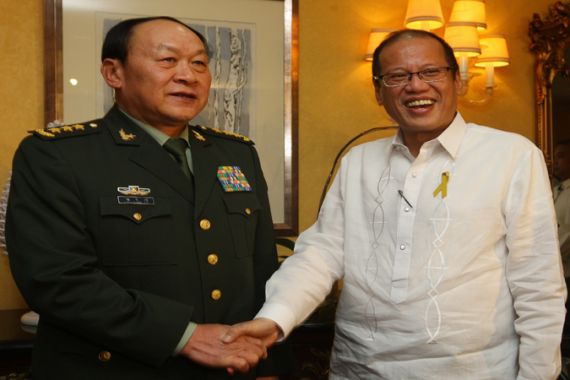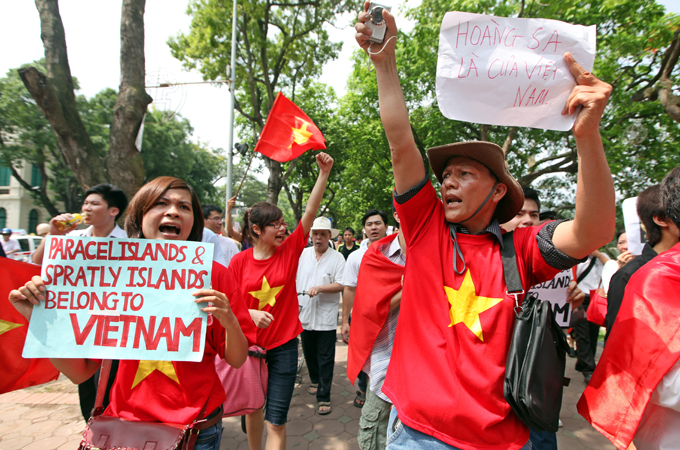Building Pax Asia-Pacifica
Relations between China, Vietnam and the Philippines worsen as sovereignty of the Spratly Islands is again disputed.

 |
| Many are wondering if armed conflict will result from escalating disputes between the Philippines, Vietnam and China [EPA] |
One of the main sources of tension in Asia nowadays are the Spratly Islands in the South China Sea, where the Philippines, Vietnam, China, and others have conflicting claims.
In Chinese media reports, the heightened “unfriendliness” in the region has allegedly arisen from “bad rumours and speculations” on the part of Filipino commentators. But the reality is starker: the intrusions by Chinese aircraft into Filipino airspace in May; Chinese patrol boats cruising in March in the Recto (Reed) Bank, 85 miles west of the Filipino island of Palawan; and, most serious of all, a Chinese missile frigate firing at Filipino fishing boats in February near Palawan’s Quirino atoll.
Will armed conflict result from these recurring – and, it seems, escalating – disputes between the Philippines and Vietnam on one side, and China on the other? War, of course, is in no one’s interest. But the risk posed by these disputes is growing, because China’s relations with both the Philippines and Vietnam are at their lowest point in decades.
Given these tensions, it is no surprise that the issue of disputed sovereignty in the South China Sea is almost certain to claim centre stage at this month’s ASEAN Regional Forum, and at the East Asia summit in Bali that will follow it.
Cooperation and stability
In June, I gave the keynote speech at the celebrations marking the 36th anniversary of the establishment of Philippines-China diplomatic relations and the tenth anniversary of Philippines-China “Friendship Day” in the presence of 5,000 of my countrymen and a smattering of Chinese officials. Yet on that same day, the headlines in Chinese papers were blasting the Philippines for its historic claim to ownership of the Spratly Islands.
Of course, the governments of both countries recognise the need to maintain the stability and cooperation that have made East Asia the world’s fastest growing region. The same is true of Vietnam’s government and that of the United States. But there is no institutionalised means to discuss and resolve the dispute, which is taking on greater significance almost daily, owing to the belief that vast mineral and energy resources lay on the sea bed around the Spratlys.
Now is the time for China, the Philippines, Vietnam, other claimants – and the US – to take action to begin to diminish these tensions. What is needed, above all, is a covenant among the leaders of the Asia-Pacific region that will make peaceful dispute resolution binding on all stakeholders, big or small. Only such a pledge can provide the type of certainty that investors – any investors – will need if the Spratly resources are to be developed.
Certainly, China’s leaders talk as if this is their goal.
Good neighbours become good friends
In April, at this year’s Boao Forum (the Asian Davos) on Hainan Island, Chinese President Hu Jintao asserted: “Peace and development remain the overriding themes of the times. The world needs peace, countries deserve development, and people want cooperation … China will always be a good neighbour, good friend, and good partner of other Asian countries.”
It is past time to make those sentiments a reality; more than a pledge to resolve disputes peacefully is needed. Asia’s governments must also begin to adhere to a far more expansive idea of open regionalism, which means that countries such as India should have a voice in Asia-Pacific affairs, and they must respect the Asian interests of countries beyond the region. The US, for example, should be made welcome to participate – or continue to participate – in peacekeeping and security cooperation.
But how is Asia to reach consensus on this point? Ever since 1994, when Vietnam’s President Le Duc Anh held the presidency of ASEAN, I have proposed to ASEAN leaders that the Spratlys be demilitarised as a first step toward building trust.
The UN Convention on the Law of the Sea (UNCLOS) and associated international commitments must become the basis for productive dialogues leading to binding covenants. Joint exploration and development of the resources within and beneath the archipelago could then begin.
More broadly, the urgent task for Asian statesmen over the next five to ten years will be to replace the region’s Pax Americana, which has guaranteed regional stability for decades, with a more comprehensive Pax Asia-Pacifica – built on inclusiveness and burden-sharing. But such an Asia-Pacific peace will be durable only if it is based on a balance of mutual benefits rather than on the balance of power.
Clearly, this concept implies burden-sharing by all Asia-Pacific countries to ensure the region’s harmony and security. Pax Asia-Pacifica’s institutions will need to be built, as Europe’s peace was built after World War II, on strong, cooperative undertakings among the most powerful countries and regional blocs – the US, China, Japan, India, South Korea, Russia, and the ASEAN 10.
The region’s continued economic growth and progress require that we Asians contain our rivalries and avoid the arms races that, unfortunately, now seem to be underway.
Fidel V Ramos is a former president of the Philippines.
A version of this article was first published on Project Syndicate.
The views expressed in this article are the author’s own and do not necessarily represent Al Jazeera’s editorial policy.
